A Quote by Andrei Tarkovsky
My encounter with another world and another culture and the beginnings of an attachment to them had set up an irritation, barely perceptible but incurable-rather like unrequited love, like a symptom of the hopelessness of trying to grasp what is boundless, or unite what cannot be joined; a reminder of how finite, how curtailed, our experience on earth must be
Related Quotes
And isn't the whole world yours? For how often you set it on fire with your love and saw it blaze and burn up and secretly replaced it with another world while everyone slept. You felt in such complete harmony with God, when every morning you asked him for a new earth, so that all the ones he had made could have their turn. You thought it would be shabby to save them and repair them; you used them up and held out your hands, again and again, for more world. For your love was equal to everything.
If they had only themselves to consider, lovers would not need to marry, but they must think of others and of other things. They say their vows to the community as much as to one another, and the community gathers around them to hear and to wish them well, on their behalf and its own. It gathers around them because it understands how necessary, how joyful, and how fearful this joining is. These lovers, pledging themselves to one another "until death," are giving themselves away, and they are joined by this as no law or contract could join them.
African tradition deals with life as an experience to be lived. In many respects, it is much like the Eastern philosophies in that we see ourselves as a part of a life force; we are joined, for instance, to the air, to the earth. We are part of the whole-life process. We live in accordance with, in a kind of correspondence with the rest of the world as a whole. And therefore living becomes an experience, rather than a problem, no matter how bad or how painful it may be.
There is no experience like having children.’ That’s all. There is no substitute for it. You cannot do it with a friend. You cannot do it with a lover. If you want the experience of having complete responsibility for another human being, and to learn how to love and bond in the deepest way, then you should have children.
To make love is to become like this infant again. We grope with our mouths toward the body of another being, whom we trust, who takes us in her arms. We rock together with this loved one. We move beyond speech. Our bodies move past all the controls we have learned. We cry out in ecstasy, in feeling. We are back in a natural world before culture tried to erase our experience of nature. In this world, to touch another is to express love; there is no idea apart from feeling, and no feeling which does not ring through our bodies and our souls at once.
Human beings, in point of fact, are lonely by nature, and one should feel sorry for them and love them and mourn with them. It is certain that people would understand one another better and love one another more if they would admit to one another how lonely they were, how sad they were in their tormented, anxious longings and feeble hopes.
My view is that I would love to see people united and loving one another, working with one another, supporting one another. I think that's a beautiful vision, so anybody trying to bring that about, I'm all for it. However, I would hate to see people pretending to unite people just for the sake of relocating them.
We know how to be doctors, nurses, lawyers. We know how to be tweeters. We know how to be everything. But how do you just be people? How do you be present with one another? How do you be honest with one another? How do you be compassionate towards one another, forgiving towards one another? We know what to do. We don't know what to be, how to be.
A lot of people are really quick to say, "That song sounds like this." Or you - "He's tryin' to sound like this." And I'm always like, "You're damn right I am. That's how - that's why we're all here." You know, we all grew up idolizing another musician. That's how this works. That's how music is created.
Who’s to say that it takes something like a drug to mess with your perception of reality? How did Hitler deceive a nation? How can one group of people look at the world and see one thing, and another see something completely different? One sees a town, another sees a desert. One sees beauty, another sees chaos.” The skin of this world,” he said quietly.






































